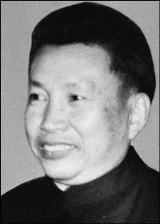
from 1963 until his death in 1998. From 1976 to 1979, he served as the Prime Minister
of Democratic Kampuchea
.
Pol Pot became leader of Cambodia
on April 17, 1975. During his time in power he imposed a version of agrarian socialism
, forcing urban dwellers to relocate to the countryside to work in collective farms and forced labour projects. The combined effects of forced labour, malnutrition, poor medical care and executions resulted in the deaths of approximately 21 percent of the Cambodian population.
Everything I did, I did for my country.![]()
I came to join the revolution, not to kill the Cambodian people. Look at me now. Am I a violent person? No. So, as far as my conscience and my mission were concerned, there was no problem.![]()
Whoever wishes to blame or attack me is entitled to do so. I regret I didn't have enough experience to totally control the movement. On the other hand, with our constant struggle, this had to be done together with others in the communist world to stop Kampuchea becoming Vietnamese.![]()
There's what we did wrong and what we did right. The mistake is that we did some things against the people—by us and also by the enemy—but the other side, as I told you, is that without our struggle there would be no Cambodia right now.![]()
The first time I heard of Tuol Sleng|Tuol Sleng, it was on the Voice of America. I listened twice.![]()
I am in extremely bad health. The blood does not reach my brain. It hurts every day.![]()

